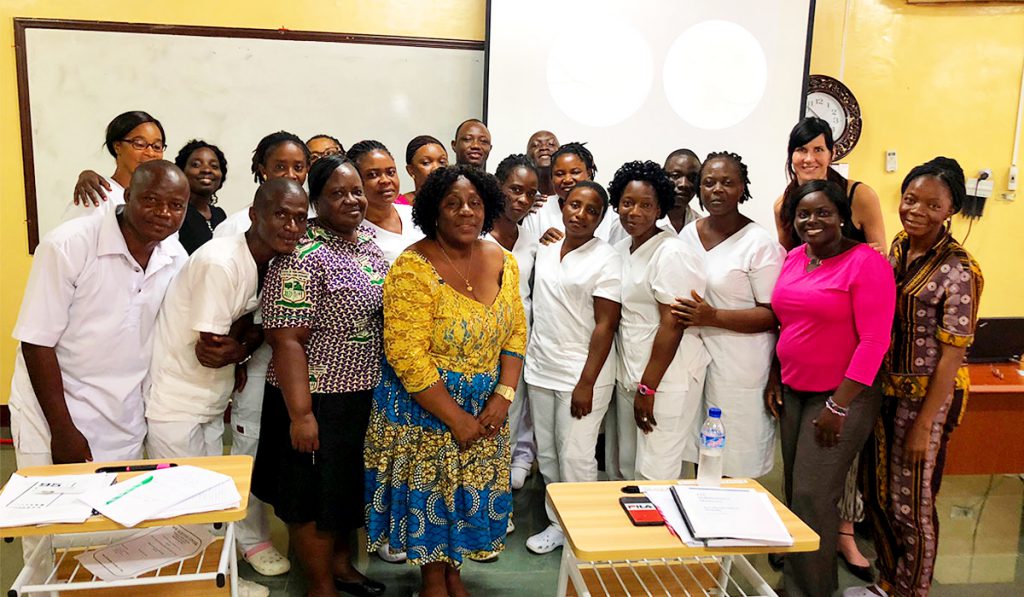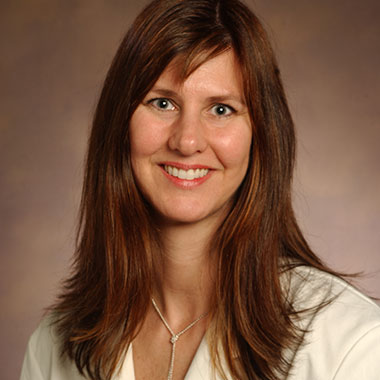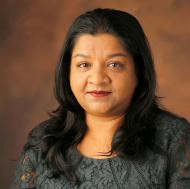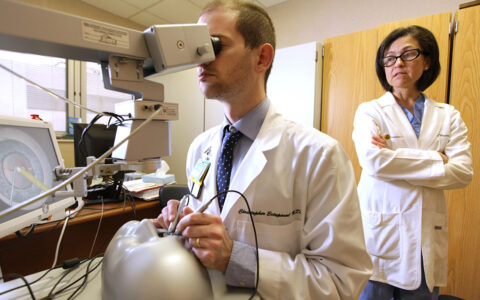As the Ebola epidemic receded in West Africa, the world health community began to realize that the hardest hit countries were not ready to manage health issues left in its wake. Rather than sending doctors, improving medical training on the ground promised a sustainable long-term solution.
USAID has put out several RFAs for Liberia to develop training programs for family practice, infectious diseases and ophthalmology. Vanderbilt University Medical Center’s Institute of Global Health was among several institutions selected for funding to develop the ophthalmology program. Troy Moon, M.D., M.P.H., associate professor of pediatrics, and Bonnie Miller, M.D., senior associate dean for health sciences education, are principal investigators on the grant, assisted by Amy Chomsky, M.D., professor of ophthalmology, and Sapna Gangaputra, M.D., M.P.H., assistant professor of ophthalmology.
The Vanderbilt faculty will travel to Liberia several times each year. The goal of the 3.5-year project is to assist the A.M. Dogliotti College of Medicine and Liberian College of Physicians and Surgeons to develop residency training in ophthalmology, to provide technical assistance for ophthalmology curriculum reform and to build institutional capacity for research.
Why Ophthalmology? Ebola and Eye Disease
The PREVAIL Project (Partnership for Research on Ebola Virus in Liberia), a Liberia-U.S. clinical research partnership established in 2015, has been evaluating survivors to assess for eye diseases such as uveitis or other long-term health effects of exposure to the virus. “Many Ebola survivors may develop eye conditions that we are currently unaware of,” Gangaputra said. “Until now, there was only one trained ophthalmologist in the entire country.”
“They often don’t even have the right supplies,” explained Gangaputra. “The appropriate medications, for example, have to be airlifted in. Fortunately, we have a really strong team of partners — NIH and the Liberian Ministry of Health have been incredibly supportive.”
The Ophthalmology Residency Program
Vanderbilt faculty and trainees will assist with curriculum and professional development for ophthalmology residents. Attending physicians from Indian eye institute L.V. Prasad will be on site at a newly established clinic at JFK Hospital in Monrovia and will provide clinical training and supervision in the OR.
Following medical school, graduates must work in the community for two years, after which they are eligible to apply for the ophthalmology residency program. The program began last fall with three residents. Chomsky, a global health veteran who has participated in ophthalmology initiatives in India, Nepal and Port-au-Prince, Haiti, visited soon thereafter.
Chomsky assessed the residents’ baseline knowledge levels, distributed textbooks and supplemental reading required of ophthalmology residents and delivered orientation lectures. “Vanderbilt has a very strict curriculum for ophthalmology residents,” she explained. “Our faculty are compiling lectures and workshops from their specialties and providing supporting textbooks.”
Vanderbilt Eye Institute also hopes to stream its Grand Rounds for the residents. “We’re incorporating distance learning,” Chomsky said. “They don’t always have internet, but they’re experts at using hotspots on their phones.”
Teaching Residents to Teach Others
“Our goal is to teach them…to broaden their horizons: how to conduct research, how to critically assess a journal article, how to address ethical issues while practicing good medicine.”
The hope is that the residents will develop into faculty who can relay their knowledge to other students. “Our goal is to teach them not just how to be good physicians,” explained Gangaputra, “but how to broaden their horizons. For instance: how to conduct research, how to critically assess a journal article, how to address ethical issues while practicing good medicine — the type of education we get here.”
This spring, the residents will go to India for three months to train at L.V. Prasad, where they will learn cataract surgery skills. The Vanderbilt Institute of Global Health team hopes at some point to bring them to Vanderbilt, to observe interactions across disciplines.
“We want them to think not just about what’s present in their environment, but about global ophthalmology issues,” said Gangaputra, who began her training in India. “Here, we’re so used to looking at things through the lens of our sub-specialties. What they need are well-rounded, comprehensive ophthalmologists who can provide quality eye care. I understand this because I’ve lived in that world; it’s easy for me to identify with their needs and limitations.”






